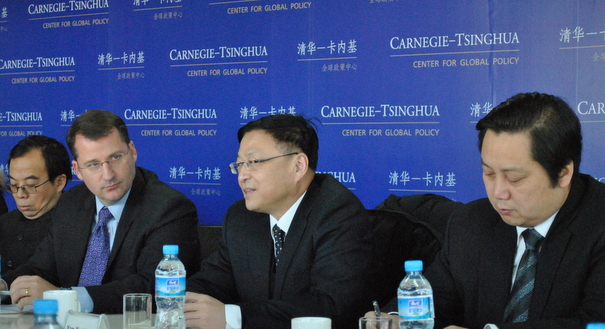Registration
You will receive an email confirming your registration.
IMGXYZ3827IMGZYXThe relationship between China and the United States has grown increasingly tense in recent years due to conflicting strategic interests. As China continues to rise as a global leader, what role will the country take in global security? The Carnegie-Tsinghua Center for Global Policy hosted top members of the American Enterprise Institute (AEI) for a discussion on the role of U.S.-Chinese cooperation in the Asia-Pacific. Participants discussed China’s rise, the purported decline of the United States, and security issues such as North Korea and the South China Sea. AEI discussants were joined by other Chinese and American scholars. Carnegie-Tsinghua’s Paul Haenle moderated the discussion.
The Changing Global Order
- United States in Decline: The idea of a U.S. decline has become increasingly prominent in the aftermath of the costly Iraq War and global financial crisis, one participant said. U.S. citizens are less concerned with non-traditional security threats and issues that are not directly tied to U.S. interests. As a result, the United States no longer has the global power and influence it once enjoyed. For this reason, one American scholar asserted that U.S. leaders wish to see China take on more global responsibility.
- China’s Ascent: Carnegie’s Yan Xuetong explained that China is neither prepared to become a global leader, nor is it inclined to become one. Despite steady economic growth, China consistently claims to be at least a decade away from becoming the leading global economy. Yan added, though, that if the United States fails to provide global security in the future, China will not allow a power vacuum to form. Rather, Beijing would anticipate a power shift to Asia in the absence of U.S. hegemony.
Regional Security Concerns
- North Korea: The North Korean issue is one area in which China and the United States have the opportunity to enhance cooperation, participants agree. The two nations have similar strategic objectives regarding the Korean peninsula. Neither member wants North Korea to obtain nuclear weapons or to perpetuate the conflict with South Korea. However, Washington and Beijing’s current priorities differ and with the coming leadership changes in both China and the United States, the future of policy cooperation is ambiguous, participants concluded.
- South China Seas: In light of the U.S. pivot toward Asia, this particular issue will be of much importance in the coming years, discussants said. One source of tension between the United States and China regarding the South China Seas is that the United States is concerned that China’s aggression indicates Beijing’s intention to assert military and naval prominence in the region. While the United States wishes to maintain freedom of navigation and open sea lanes, China is more concerned with the military symbolism of the region, one Chinese participant added. However, they added that China lacks a unified stance on the issue internally, which may hinder its ability to negotiate with other nations in the region.
The Future of U.S.-China Cooperation
There are a number of serious global security challenges facing the international community, from nuclear proliferation to climate change. As worries grow that the United States may be unable to unilaterally provide global security, China must decide how it will adapt, participants said. Cooperation between China and the United States on regional, as well as global, issues will be necessary for maintaining international law and trade and combatting climate change. But while China and the United States are both heavily dependent on one another economically, Yan pointed out that there is no foundation for mutual trust. Discussants agreed that such a foundation must be built in order to enable further cooperation.
Discussants: Arthur Brooks, Tully M. Friedman, Harlan Crow, Daniel Blumenthal
